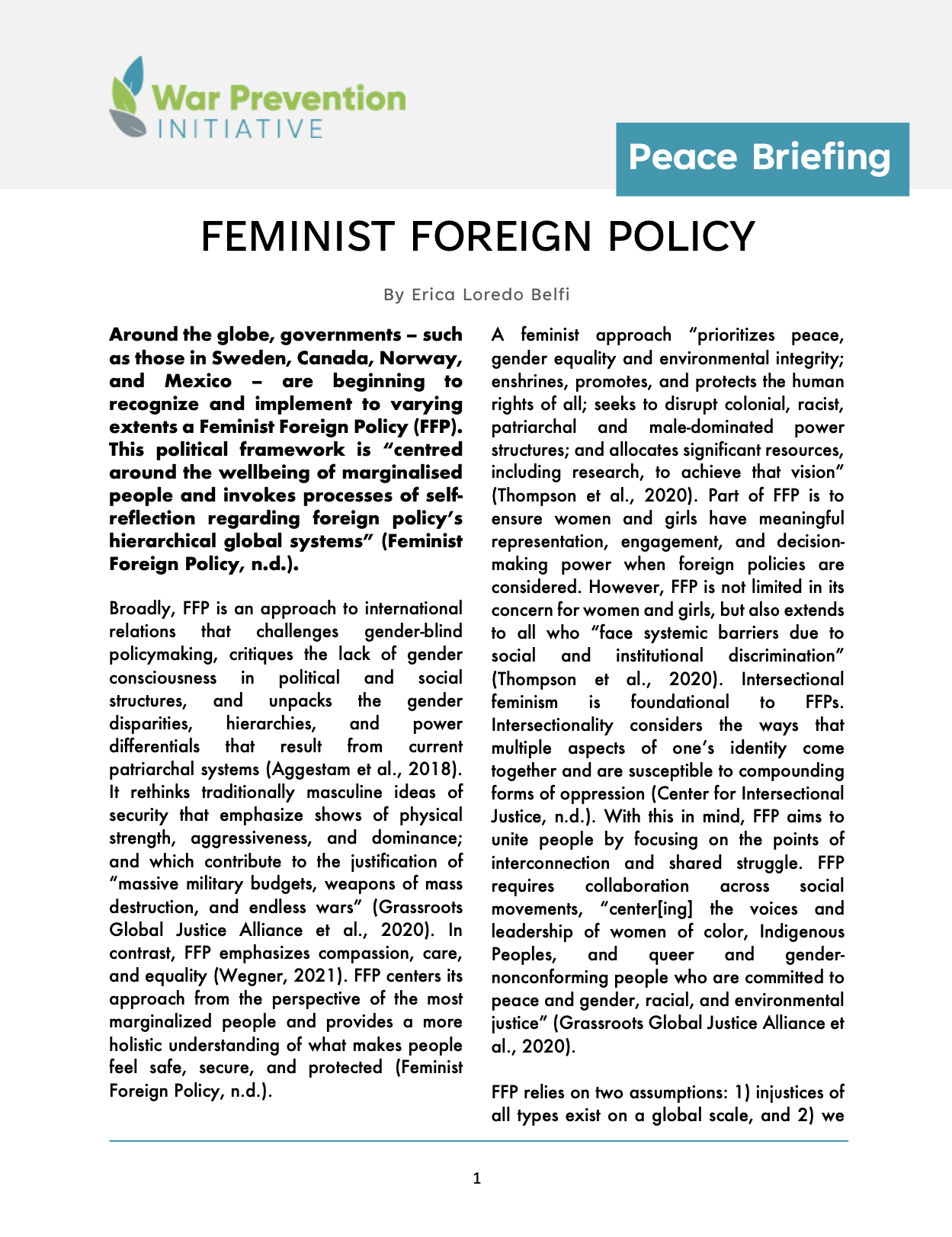Around the globe, governments are beginning to recognize and implement to varying extents a Feminist Foreign Policy (FFP). This political framework is “centred around the wellbeing of marginalised people and invokes processes of self-reflection regarding foreign policy’s hierarchical global systems” (Feminist Foreign Policy, n.d.).
Broadly, FFP is an approach to international relations that challenges gender-blind policymaking, critiques the lack of gender consciousness in political and social structures, and unpacks the gender disparities, hierarchies, and power differentials that result from current patriarchal systems (Aggestam et al., 2018). It rethinks traditionally masculine ideas of security that emphasize shows of physical strength, aggressiveness, and dominance; and which contribute to the justification of “massive military budgets, weapons of mass destruction, and endless wars” (Grassroots Global Justice Alliance et al., 2020). In contrast, FFP emphasizes compassion, care, and equality (Wegner, 2021). FFP centers its approach from the perspective of the most marginalized people and provides a more holistic understanding of what makes people feel safe, secure, and protected (Feminist Foreign Policy, n.d.).
A feminist approach “prioritizes peace, gender equality and environmental integrity; enshrines, promotes, and protects the human rights of all; seeks to disrupt colonial, racist, patriarchal and male-dominated power structures; and allocates significant resources, including research, to achieve that vision” (Thompson et al., 2020). Part of FFP is to ensure women and girls have meaningful representation, engagement, and decision-making power when foreign policies are considered. However, FFP is not limited in its concern for women and girls, but also extends to all who “face systemic barriers due to social and institutional discrimination” (Thompson et al., 2020). Intersectional feminism is foundational to FFPs. Intersectionality considers the ways that multiple aspects of one’s identity come together and are susceptible to compounding forms of oppression (Center for Intersectional Justice, n.d.). With this in mind, FFP aims to unite people by focusing on the points of interconnection and shared struggle. FFP requires collaboration across social movements, “center[ing] the voices and leadership of women of color, Indigenous Peoples, and queer and gender-nonconforming people who are committed to peace and gender, racial, and environmental justice” (Grassroots Global Justice Alliance et al., 2020).
FFP relies on two assumptions: 1) injustices of all types exist on a global scale, and 2) we must address these injustices by mitigating the circumstances which contribute to them, including systems of oppression such as white supremacy, patriarchy, capitalism, and colonialism (Lunz & Bernarding, 2019). In addition to taking an intersectional feminist approach, FFP works from these assumptions by focusing on collective care and reparative policies. FFPs offer a different kind of security by providing for peoples’ basic needs, such as healthcare, housing, or food security. For example, FFPs may include global health policies during a pandemic which prioritize universal access to vaccines, or foreign policy that provides humanitarian aid in times of natural disaster. Such policies embrace a global interdependent mindset. It also seeks to address historical injustice by furthering “a regenerative anti-racist feminist economy that prioritizes caring, equity, [and] sustainability” (Grassroots Global Justice Alliance et al., 2020).
FFPs in Sweden, Canada, Mexico, France, Norway, and other countries are working at various extents to eliminate structurally enforced gender disparities, prioritize funding and participation for women and marginalized minorities in peacemaking processes, and combat gender-based violence (Grassroots Global Justice Alliance et al., 2020; Thompson & Clement, n.d.). Without adopting FFPs and the structures and representation they require, governments run the risk of perpetuating existing inequalities and systems of oppression (Thompson & Clement, n.d.). Furthermore, an intersectional feminist approach is key to developing healthy, peaceful, and just domestic policy, not exclusively important to foreign policy. (Grassroots Global Justice Alliance et al., 2020). By disrupting patriarchal and colonial power structures that drive militarism and instead guiding foreign policies with a feminist lens, more countries can bring about the urgent change necessary for establishing a world that provides security for all.
Works Cited:
Aggestam, K., Rosamond, A. B., & Kronsell, A. (2018). Theorising feminist foreign policy. International Relations, 33(1), 23–39.
Center for Intersectional Justice. (n.d.). What is Intersectionality? https://www.intersectionaljustice.org/what-is-intersectionality
Feminist Foreign Policy. (n.d.). Feminist Foreign Policy. Retrieved April 26, 2022, fromhttps://centreforfeministforeignpolicy.org/feminist-foreign-policy
Grassroots Global Justice Alliance, MADRE, & Women Cross DMZ. (2020). A Vision for A Feminist Peace. https://www.feministpeaceinitiative.org/pdf/index/FFP-Report-English-R11.pdf
Lunz, K., & Bernarding, N. (2019). Feminist foreign policy—Imperative for a more secure and just world. Centre for Feminist Foreign Policy. https://centreforfeministforeignpolicy.org/journal/2019/2/16/feminist-foreign-policy-imperative-for-a-more-secure-and-just-world
Thompson, L., & Clement, R. (n.d.). Defining Feminist Foreign Policy. International Center for Research on Women. https://www.wo-men.nl/kb-bestanden/1625575142.pdf
Thompson, L., Patel, G., Kripke, G., & O’Donnell, M. (2020). Toward A Feminist Foreign Policy in the United States. International Center for Research on Women. https://www.icrw.org/wp-content/uploads/2020/05/FFP-USA_v11-spreads.pdf
Wegner, N. (2021). Helpful heroes and the political utility of militarized masculinities. International Feminist Journal of Politics, 23(1), 5-26

